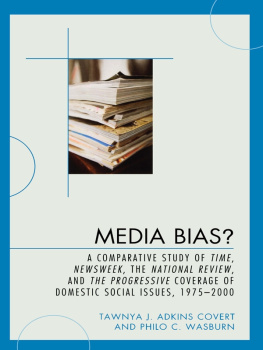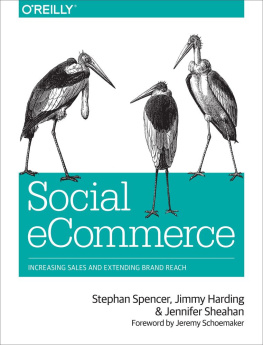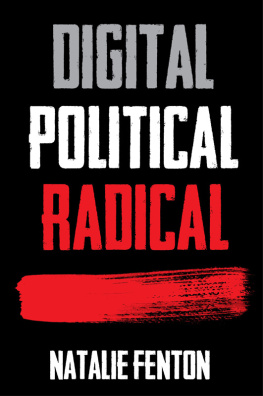2010 by Jessica Clark and Tracy Van Slyke
All rights reserved.
No part of this book may be reproduced, in any form, without written permission from the publisher.
Requests for permission to reproduce selections from this book should be mailed to: Permissions Department, The New Press, 38 Greene Street, New York, NY 10013.
Published in the United States by The New Press, New York, 2010
Distributed by W. W. Norton & Company, Inc., New York
LIBRARY OF CONGRESS CATALOGING-IN-PUBLICATION DATA
Clark, Jessica.
Beyond the echo chamber : reshaping politics through networked progressive media / Jessica Clark and Tracy Van Slyke.
p. cm.
Includes bibliographical references and index.
ISBN 978-1-59558-471-7 (pbk. : alk. paper) 1. Mass media--Political aspectsUnited StatesHistory21st century. 2. Online journalismPolitical aspectsUnited StatesHistory21st century. 3. United StatesPolitics and government20012009. I. Van Slyke, Tracy. II. Title.
P95.82.U6C53 2010
302.230973dc222009037840
The New Press was established in 1990 as a not-for-profit alternative to the large, commercial publishing houses currently dominating the book publishing industry. The New Press operates in the public interest rather than for private gain, and is committed to publishing, in innovative ways, works of educational, cultural, and community value that are often deemed insufficiently profitable.
www.thenewpress.com
Composition by The Influx House
This book was set in Kievit and Janson Text
Wed like to dedicate this book to our husbands, Dan and
Spoonwho put up with, cooked for, and stuck with us during
countless work-filled nights and weekendsand to our parents,
who inspired us to be passionate about the world.
INTRODUCTION
On May 10, 2007, investigative reporter Jeremy Scahill and documentary film producer Robert Greenwald testified before Congress on the role of private contractors in the war on Iraq. Both had already spent many months investigating how and why a shadow force of soldiers-for-hire was being allowed to fight alongside U.S. troops for more pay, with less oversight.
Many Americans are under the impression that the U.S. currently has about 145,000 active duty troops on the ground in Iraq, Scahill testified. His New York Times bestselling book, Blackwater: The Rise of the Worlds Most Powerful Mercenary Army , emerged from a series of articles supported by The Nation Institute and published for The Nation , Americas oldest left-leaning magazine. What is seldom mentioned is the fact that there are at least 126,000 private personnel deployed alongside the official armed forces. These private forces effectively double the size of the occupation force, largely without the knowledge of the U.S. taxpayers that foot the bill.
Greenwald, who directed the 2006 film Iraq for Sale: The War Profiteers , invoked the many personal stories uncovered by his research team at Brave New Films, the production company he founded in 2004. He described how U.S. Army SPC David Mann, a radio repair technician who served in Iraq, was forced to train private contractors from the corporation KBR to replace him. Stewart Scott, a former employee for Halliburton (another corporation employed in Iraq by the U.S. government), revealed that contractors had stayed in five-star hotels while U.S. soldiers
The presence of Scahill and Greenwald in front of the House Appropriations Subcommittee on Defense revealed that the independent, progressive media had broken through to Capitol Hill on a critical matter of national defense policy. The debate in Congress eventually led to provisions in the 2008 Defense Authorization Bill that would tighten government oversight of private security contractors working in Iraq and Afghanistan, requiring clear rules of engagement for private guards and establishing minimum standards for hiring and training them. The contractors would also have to comply with military regulations and orders issued by commanders in a war zone. President George W. Bush vetoed the bill in December 2007. But the issue could not be stopped. By December 2008, Scahill reported, six Blackwater operatives had either been indicted on or pled guilty to manslaughter charges related to the shooting deaths of Iraqi civilians.
Without in-depth reporting and powerful storytelling to forcefully drive it, the issue of military contractors never would have sparked such contentious political debate. A reporter testifying before Congress may not seem remarkable, but this is one among a series of critical moments that together mark a new era for explicitly left-leaning media makers.
Some, like Scahill, worked their way up through the ranks of openly partisan outlets such as Democracy Now! and The Nation , following the muckraking tradition of Upton Sinclair and I. F. Stone. Others, like Greenwald, left lucrative commercial careers, spurred by a sense of outrage and urgency. Collectively, their choices have paid off: from magazines to blogs, documentary films to YouTube videos, national radio stations to podcasts, media that loosely identify themselves as progressive are more visible and influential than ever before.
WHATS PROGRESSIVE MEDIA, ANYWAY?
Such media projects span both old and new platforms, drawing upon a variety of political perspectives and rhetorical strategies. In the chapters that follow, we focus largely on projects and outlets that offer journalism and political commentary, rather than media produced by campaigns, advertisers, or political advocacy groupsalthough its worth noting that the boundaries have blurred significantly online.
The term progressive has its historical basis in political movements and parties from the turn of the twentieth century. At its root is the idea of social progress, as opposed to conservative philosophies that seek to maintain older systems of value and power. Revived, the term served a number of functions as it entered the general lexicon over the course of the Bush administration. Progressive distinguished followers from wimpy liberals, signaling a political identity that was left of center but not fundamentally radical, and provided a rallying cry for a younger group of (big- D and little- d ) democratic activists. A 2005 article from the Web site Campus Progress offers a working definition:









